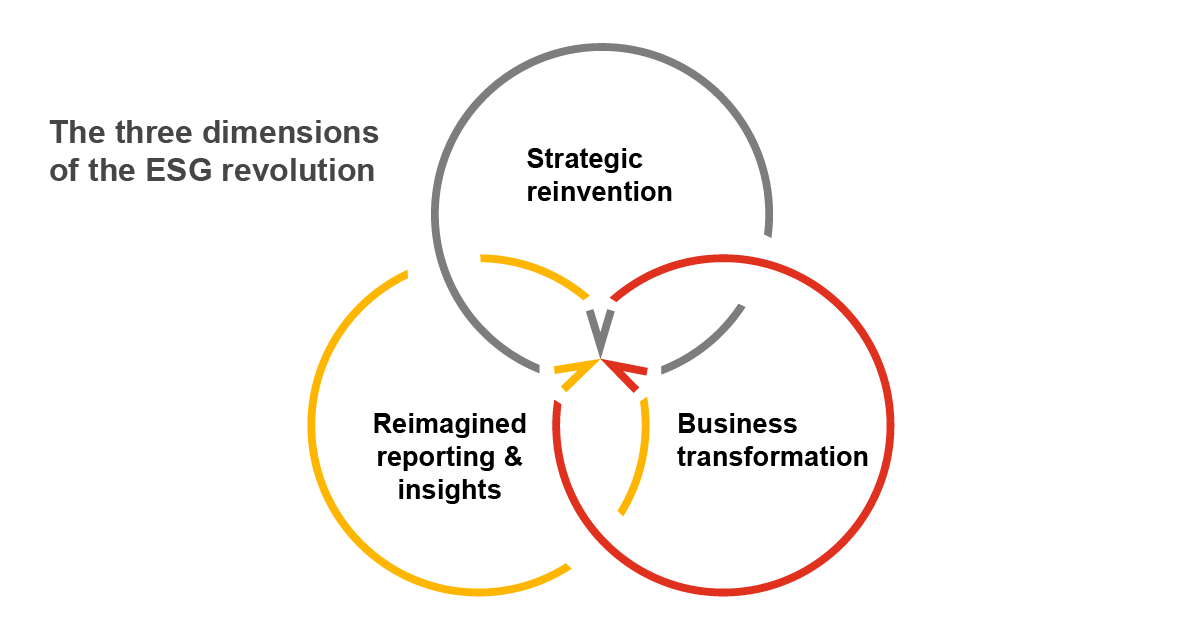
From strategy to a sustainable and profitable business model
03/08/22
Transformation within the ESG economy
Growing urgency and ambitions in the field of ESG require many companies to make far-reaching changes to their strategic choices, the management and structure of their organisation, and also the way they report on ESG. Taken together, these changes are creating a true ESG revolution. A lot of companies are still struggling with the fundamental questions that that revolution raises. What do we stand for? What will our position be within the future ESG economy, and how will we create value within it? These are questions that demand a thorough strategic reorientation and fundamental choices, leading to a business transformation.

Viviana Voorwald, ESG lead at PwC Netherlands

‘Three-quarters of the investments for achieving a sustainable business model are made in this transformation phase.’
ESG transformation: from PowerPoints to workplace
It is time for a crucial step, namely from thinking to doing. The conclusion of our previous article on ESG and strategy marked the start of that transition. We described how companies – often on the basis of new insights in their ESG reports – have developed an ESG strategy and goals. These are intended to lead to a potentially renewed, sustainable, and thus profitable business model in the long term.
It’s now time for the next step: from PowerPoints to the workplace, from talking to walking, from what to how. It’s all about action: taking decisions with sometimes far-reaching and painful consequences, dropping certain products, services, relations with suppliers, or presence in particular countries. But it’s also about investing in new production processes, new talent, and new partnerships.
In other words, what's needed is a full-blown ESG transformation. As a rule of thumb, we would argue that three-quarters of the investments for achieving a sustainable business model are made in this transformation phase.
A matter for the boss: leadership is decisive
And if we haven't already made it clear enough: an ESG transformation is 'a matter for the boss' and needs to be on the agenda of the CEO. The report that this series is based on emphasises that leadership is decisive for the success of an ESG transformation. In PwC’s recent CEO survey, 'a lack of attention or support from leaders' scores high on the list of obstacles to achieving ESG results.
How far advanced are Dutch companies in their ESG transformation, and what role do their leaders play? 'There are only a few early adapters that have made such a transformation under the leadership of a visionary CEO and driven by their ‘purpose’,' says Viviana Voorwald, ESG Lead for PwC Europe and the Netherlands. 'In my opinion, too many leaders are still mainly dealing with ESG because they know they have to, because it gives them a competitive advantage, or because they would otherwise run up against fines or harm to the company's reputation. At the top, there’s still a lack of the real intrinsic conviction and motivation needed to seriously pursue the transformation. That means that the goals then remain too cautious.'

‘All the various methodologies, tools, and roadmaps aren’t sufficient to achieve the global systemic change that’s needed if people aren’t able to change their own behaviour.’
A lot of difficult and complex work?
That critical observation immediately needs to be qualified. Voorwald: 'The issue of ESG is of course an enormous and complex one. It demands the involvement of everyone in the organisation: every department and all the available expertise needs to be mobilised and connected up. That’s why the role of leadership is so essential.'
Voorwald emphasises that it’s also a great deal of work. 'Companies don’t just need to identify and reduce their CO2 emissions, but also to work on their impact on biodiversity, their contributions to community building, their tax policy, and so on. And that’s while there’s still so much uncertainty about technological developments, legislation and regulations, and the global situation. I mean, it's usually not a lack of will on the part of companies that find this difficult to tackle; they're really struggling with the complexity and magnitude of the task they're facing.'
Sometimes cautious, sometimes rigorous
So how do you break through that complexity and overcome that uncertainty? How do you start taking action and begin with an ESG transformation? Willem-Jan Dubois, a partner and ESG expert at PwC, has this to say: 'ESG and sustainability are about success in the long term. You can only achieve that long-term success if you remain successful in the shorter term too. That means you’ll always need to make wise and properly balanced choices, which may well be different for each company or sector.
'That sometimes means taking cautious small steps forward, while at other times you can be rigorous and energetic. The automotive industry is a good example. More and more car manufacturers are announcing that in a few years' time they’ll only be producing electric models. This isn’t something they just decide on overnight. They can only take that drastic step because they’ve been working towards it in smaller steps for many years.'
Shy away or rise to the occasion
There's therefore no optimum approach that works for every company or sector. One approach can be to start small, with just a single department or process, and set a goal that lies within your own sphere of influence. Dubois: 'When we present this during sessions with clients, there are always people around the table who shy away nervously. But, there are always some who rise to the occasion.'

Willem-Jan Dubois, ESG-expert PwC Netherlands
‘Treat ESG just as seriously as any other strategic issue: prioritise it, assign your best people to it, and make sure you have sufficient resources.'
Those are the champions with the vision, motivation, and boldness to really stand up tall for this issue. You need them to create inspiring success stories that spread through the organisation like an oil slick. Another approach, according to Dubois, is to see which platform needs it the most. 'Organisations in CO2-intensive industries have to work harder than companies that have less impact on their environment and are less in the spotlight. I expect ESG reporting to become an increasingly important priority for most listed companies. The fact that they have to report publicly and provide transparency will really get things moving.'
In our series, we’ve described how a true ESG revolution can take place if reporting, strategy and transformation are combined. For that turnaround to actually lead to a new and sustainable business model that’s also profitable in the long term, ESG will need to become an integral part of the strategy, and not just a collection of separate activities.
Willem-Jan Dubois: 'As long as ESG is viewed as a separate matter to be discussed at the end of a meeting, you won’t achieve any results. It needs to be treated just as seriously as any other strategic issue: prioritise it, assign your best people to it, make sure you have sufficient resources, and involve stakeholders both inside and outside the organisation. And make sure that you can manage with results in mind: clarify your current situation, specify where you want to be after a certain time, and define the actions needed to bridge the gap.'
Just setting a good example isn't enough
Viviana Voorwald emphasises that the human aspect is crucial: 'It’s perfectly easy to set out theoretically what our own 'net zero' business model looks like, with all the processes, systems, and organisational aspects. But the key question is how to get everyone on board. That starts with awareness of ESG and what it means for us, how we can make a difference. How do we incorporate it into everything we do, and what behaviour changes does it require from everybody? The number one success factor is still to have a boss who proclaims that it’s important and acts accordingly. But just setting a good example isn't enough. You have to get everybody in the organisation – from the top to the bottom – involved in making the necessary changes.'
According to Voorwald, the so-called Inner Development Goals (IDGs) can make a huge contribution. In 2015, the United Nations defined the seventeen Sustainable Development Goals (SDGs) to be achieved by 2030. 'A major reason why there isn't enough progress in achieving the SDGs is that there’s not enough focus on how we need to change.' The IDGs have been developed to supplement the SDGs, specifically so as to make that sustainable development possible.
To Viviana Voorwald, the key to success is a change in behaviour. 'Knowledge and awareness about what needs to change is necessary, but how you can actually change your behaviour and take the lead in transformations is essential. It then comes down to personal qualities and skills. All the various methodologies, tools, and roadmaps aren’t sufficient to achieve the global systemic change that’s needed if people aren’t able to change their own behaviour.'
The five categories with skills and qualities at the core of the Inner Development Goals





















